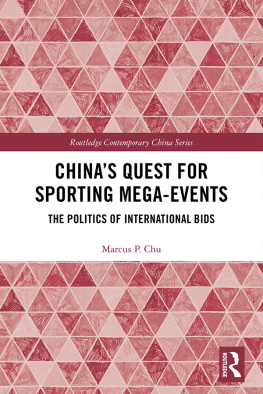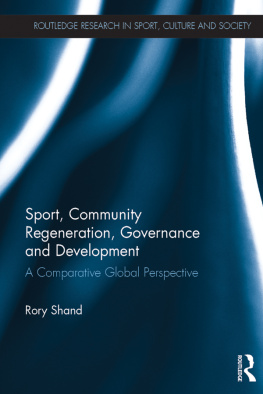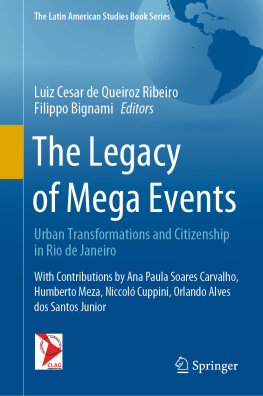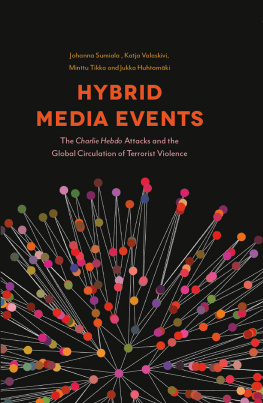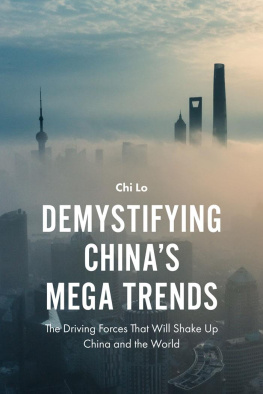
Globalizing Sport Studies
Series editor: John Horne, Professor of Sport and Sociology,
University of Central Lancashire, UK
Public interest in sport studies continues to grow throughout the world. This series brings together the latest work in the field and acts as a global knowledge hub for interdisciplinary work in sport studies. While promoting work across disciplines, the series focuses on social scientific and cultural studies of sport. It brings together the most innovative scholarly empirical and theoretical work, from within the UK and internationally.
Books previously published in this series by Bloomsbury Academic:
Global Media Sport: Flows, Forms and Futures
David Rowe
Japanese Women and Sport: Beyond Baseball and Sumo
Robin Kietlinski
Sport for Development and Peace: A Critical Sociology
Simon Darnell
Globalizing Cricket: Englishness, Empire and Identity
Dominic Malcolm
Global Boxing
Kath Woodward
Sport and Social Movements: From the Local to the Global
Jean Harvey, John Horne, Parissa Safai, Simon Darnell and Sebastien Courchesne-ONeill
Football Italia: Italian Football in an Age of Globalization
Mark Doidge
Books previously published in this series by Manchester University Press:
The Greening of Golf: Sport, Globalization and the Environment
Brad Millington and Brian Wilson
Sport and Technology: An Actor-Network Theory Perspective
Roslyn Kerr
Sport in the Black Atlantic: Cricket, Canada and the Caribbean Diaspora
Janelle Joseph
Localizing Global Sport for Development
Iain Lindsey, Tess Kay, Ruth Jeanes and Davies Banda
Mega-events and social change
Spectacle, legacy and public culture
Maurice Roche
Manchester University Press
Copyright Maurice Roche 2017
The right of Maurice Roche to be identified as the author of this work has been asserted by him in accordance with the Copyright, Designs and Patents Act 1988.
Published by Manchester University Press
Altrincham Street, Manchester M1 7JA
www.manchesteruniversitypress.co.uk
British Library Cataloguing-in-Publication Data
A catalogue record for this book is available from the British Library
Library of Congress Cataloging-in-Publication Data applied for
ISBN978 1 5261 1708 3hardback
First published 2017
The publisher has no responsibility for the persistence or accuracy of URLs for any external or third-party internet websites referred to in this book, and does not guarantee that any content on such websites is, or will remain, accurate or appropriate.
Typeset in 10.25 on 14.5pt MinionPro-Regular
by Toppan Best-set Premedia Limited
For my fine young grandson, Hector Roche (born 13 October 2014), for whom Life is now the great event
There is now a considerable amount of expertise nationally and internationally in the social scientific and cultural analysis of sport in relation to the economy and society more generally. Contemporary research topics, such as sport and social justice, science and technology and sport, global social movements and sport, sports mega-events, sports participation and engagement and the role of sport in social development, suggest that sport and social relations need to be understood in non-Western developing economies, as well as European, North American and other advanced capitalist societies.
The series Globalizing Sport Studies is thus in line with a massive growth of academic expertise, research output and public interest in sport worldwide. At the same time, it seeks to use the latest developments in technology and the economics of publishing to reflect the most innovative research into sport in society currently underway in the world. The series is multi-disciplinary, although primarily based on the social-sciences and cultural-studies approaches to sport.
The broad aims of the series are to: act as a knowledge hub for social-scientific and cultural-studies research in sport, including, but not exclusively, anthropological, economic, geographic, historical, political science and sociological studies; contribute to the expanding field of research on sport in society in the United Kingdom and internationally by focusing on sport at regional, national and international levels; create a series for both senior and more junior researchers that will become synonymous with cutting-edge research, scholarly opportunities and academic development; promote innovative discipline-based, multi-, inter- and trans-disciplinary theoretical and methodological approaches to researching sport in society; provide an English-language outlet for high-quality non-English writing on sport in society; and publish broad overviews, original empirical research studies and classic studies from non-English sources.
When the Globalizing Sport Studies series began I approached several authors including Maurice Roche to see if they were interested in contributing to it. It is a great pleasure therefore to see the publication of Mega-events and social change. In this volume Maurice Roche offers what might be seen as the sequel to his pioneering work on mega-events, Mega-events and Modernity, first published in 2000. Mega-events and social change in many ways surpasses that earlier volume and offers sociology, as well as the emerging fields of event, critical event, and mega-event studies, a more comprehensive, theoretically sustained, and sophisticated contribution. By focusing on change across three modalities mass communications media, cities and urban environments, and global cultures the book offers the most valuable overview of mega-events and social change published to date.
As Roche notes, since his earlier book was published, new issues have arisen that contour the social and cultural contexts for the hosting of mega-events. He refers to these as features of secondary-phase modernisation, including the technological changes brought about by the digital revolution, the global ecological crisis and the development of complex globalisation processes. These issues help shape the contradictory tensions underpinning mega-events in the twenty-first century, between their continued expansion, growth and apparent popularity on one hand and the development of greater risks and vulnerability on the other.
In September 2016, for example, the rising costs of hosting the Olympic and Paralympic Games in Tokyo in 2020 were announced by an expert panel, and Rome's city council voted against supporting a bid for the 2024 Games. Both developments indicate ways in which a disenchantment with (sports) mega-events is growing. This disenchantment is not news to those academics, researchers and journalists who have been arguing for some time that there are difficulties with the hosting of mega-events as they are currently organised. Yet the attractiveness of, and expansion in, hosting the Olympics and other sports mega-events has been underpinned by several social developments technological, economic and political that Roche addresses in this book. Sports mega-events now have a global audience as a result of technological innovation in mass communication, especially the development of satellite television. The related formation of a sportmediabusiness alliance transformed sports mega-events and professional sport generally in the late twentieth century. The idea of packaging, via the tri-partite model of sponsorship rights, exclusive broadcasting rights and merchandising, attracted sponsors of the Olympics through the association with sports and the vast global audience exposure that the events achieve. Similarly, interest in hosting sports mega-events has grown as they have become seen as valuable promotional opportunities for cities and regions. Hence in an era when world-class city status is still seen as a vital asset in attracting and often redirecting flows of capital, investment and people, the fame and celebrity thought to accompany being one of a small number of, say, Olympic host cities, remains a heady brew.


